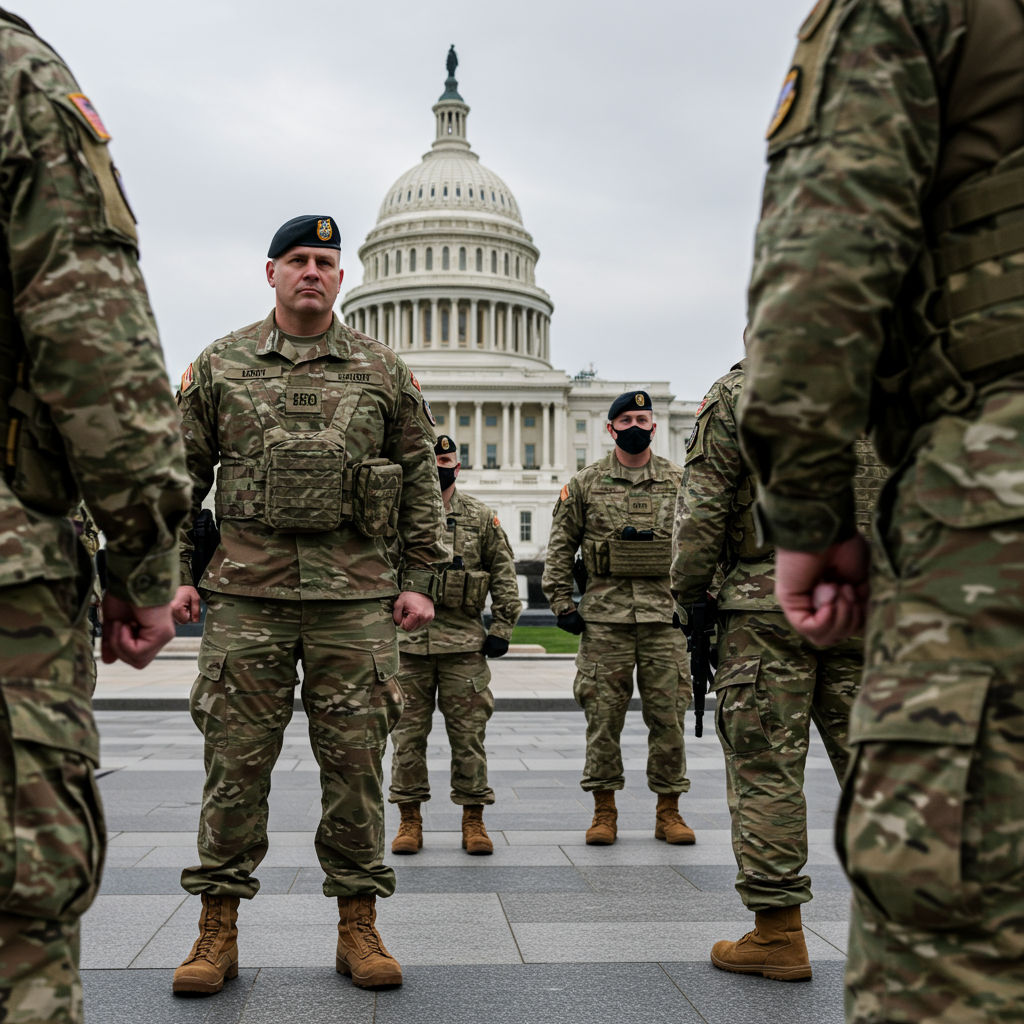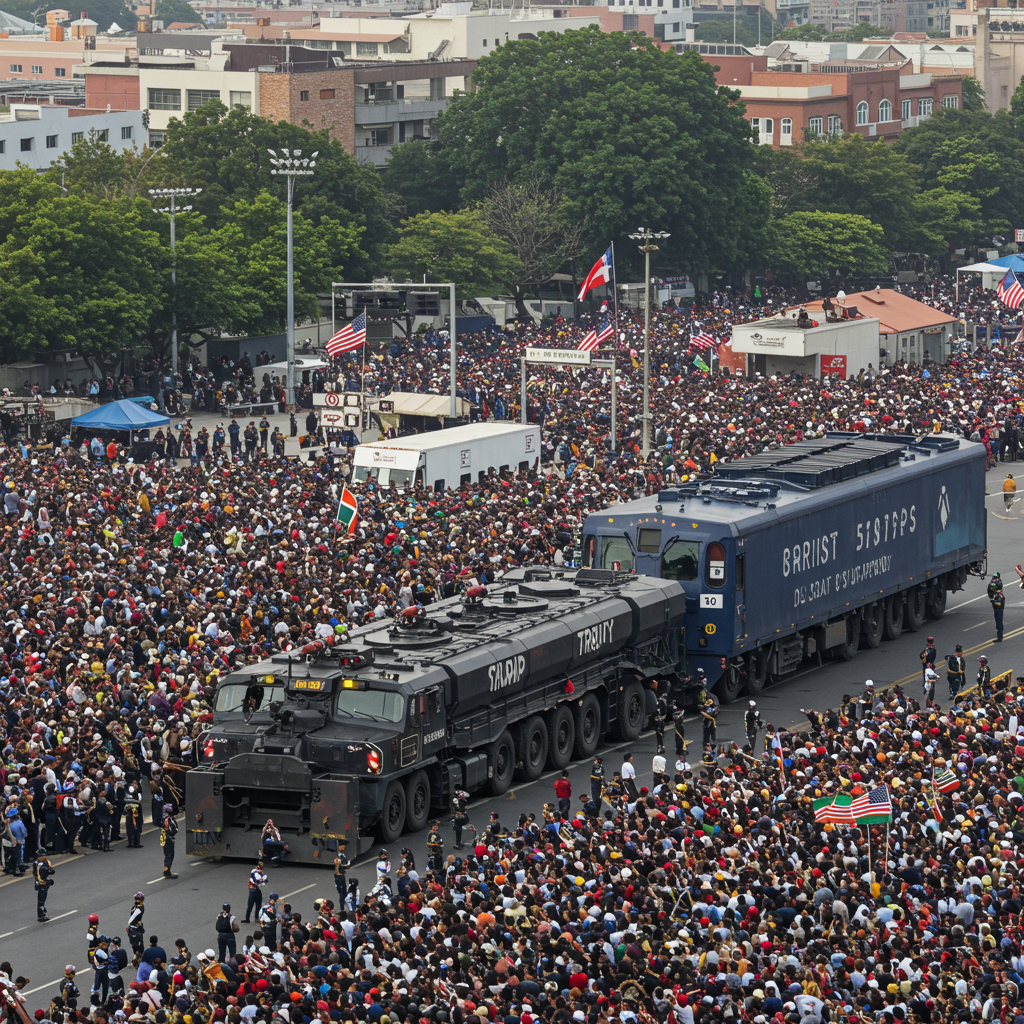Washington, D.C., is currently the focal point of a significant federal initiative as the West Virginia National Guard (WVNG) deploys personnel to the nation’s capital. This strategic move, requested by the Trump administration and authorized by Governor Patrick Morrisey, aims to bolster federal authority in the District of Columbia. The deployment signals a notable shift in the management of D.C.’s public spaces and local governance, sparking widespread discussion among city officials and residents.
This comprehensive federal action is set to involve a substantial contingent of the West Virginia National Guard. Their mission is multifaceted, focusing on initiatives designed to “restore cleanliness and safety” throughout the capital. The federal government will fully fund this operation, emphasizing the scale and scope of the presidential directive.
Understanding the WVNG’s Role in Washington, D.C.
Under the leadership of Maj. Gen. Jim Seward, the West Virginia National Guard is dispatching between 300 and 400 highly trained personnel. These troops bring specialized training and mission-essential equipment to the nation’s capital, ready to support the federal agenda. The funding mechanism underscores the direct involvement and financial commitment from the federal level, distinguishing this deployment from typical state-led National Guard activities.
The primary stated goal of the deployment, as articulated by the Trump administration, is to enhance the overall public environment of Washington, D.C. This encompasses efforts to improve civic order and ensure a perception of security. The presence of National Guard troops is intended to serve as a visible manifestation of increased federal oversight in urban management and public safety.
Directives Shaping the Deployment’s Impact
This latest deployment is part of a broader push by the Trump administration to expand federal control within the District. Two key directives stand out, illustrating the specific areas where federal authority is being amplified:
- Extended Federal Control over the Metropolitan Police Department (MPD): This initiative seeks to integrate or at least assert greater federal oversight into the operations of D.C.’s local law enforcement agency. Such a move carries significant implications for local policing autonomy and the established framework of D.C.’s home rule.
- Clearing of Homeless Encampments: A direct order has been issued to address and clear homeless encampments across the city. While framed as part of the “cleanliness and safety” initiative, this directive raises considerable humanitarian and social policy questions, drawing attention to how D.C. manages its most vulnerable populations.
The implications of these directives are extensive. They touch upon fundamental aspects of urban governance, public welfare, and the delicate balance of power between federal and local authorities in the nation’s capital.
Perspectives on Federal Authority in the District
The expansion of federal authority in Washington, D.C., has predictably elicited varied responses. Governor Patrick Morrisey expressed clear support for the President’s vision. “West Virginia is proud to stand with President Trump in his effort to restore pride and beauty to our nation’s capital,” Morrisey stated. He further emphasized that the mission “reflects our shared commitment to a strong and secure America,” aligning the state’s actions with a broader national security and civic pride narrative.
Maj. Gen. Seward echoed this sentiment, underscoring the Guard’s readiness to assist. “We stand ready to support our partners in the National Capital Region and contribute to the collective effort of making our nation’s capital a clean and safe environment,” Seward affirmed. These statements highlight the official justification for the deployment, focusing on cooperation and public benefit.
Concerns Among D.C. Officials and Residents
While federal and state officials frame the deployment as a necessary step for capital improvement, local Washington, D.C., officials and residents have voiced growing concerns. A primary worry revolves around the potential loss of D.C.’s local autonomy. The District has long sought greater self-governance, including statehood, and any perceived federal overreach is met with apprehension.
City leaders are particularly sensitive to directives that appear to bypass local decision-making processes, especially concerning the Metropolitan Police Department. The idea of federal control over local policing raises questions about accountability, community relations, and the unique challenges faced by urban law enforcement. Similarly, the approach to homeless encampments has drawn scrutiny, with many advocating for compassionate, long-term solutions rather than forced displacement. The balance between federal directives and the local administration’s ability to govern its own affairs remains a significant point of contention.
Historical Context and Precedent for Guard Deployments
The deployment of the National Guard to Washington, D.C., is not without historical precedent. The Guard often plays a crucial role in supporting civil authorities during emergencies, national events, or periods of unrest. However, deployments focused on altering local governance structures or directly managing social issues like homelessness under federal directive are less common and tend to be more controversial. Understanding the historical relationship between the federal government and D.C. is vital. Unlike states, the District operates under direct congressional authority, granting the federal government unique powers over its affairs. This legal framework often serves as the basis for such broad federal interventions, though it also fuels the ongoing debate about D.C.’s self-determination.
The current federal actions build on a history of federal involvement in the capital’s affairs. Previous administrations have also deployed federal resources, but the specific directives concerning police oversight and social policy mark a more assertive approach. These steps have reignited conversations about the extent of federal power and the rights of D.C. residents to manage their own city.
Strategic Implications of Increased Federal Presence
The implications of this heightened federal presence extend beyond immediate operational concerns. It signals a strategic shift in how the capital’s daily functions and civic challenges are addressed. This move could influence future policy decisions regarding urban planning, social services, and law enforcement strategies in D.C. The deployment also highlights the ongoing political tensions surrounding the capital’s unique status.
The federal funding aspect means that West Virginia troops are deployed and maintained without cost to the state, making it an attractive proposition for participating states. This federal funding model allows for sustained operations in the capital, supporting the administration’s long-term objectives for the city. As the deployment continues, observers will watch closely to see how the partnership between federal forces and local authorities evolves, and what long-term effects these federal actions have on the vibrant and complex fabric of Washington, D.C.
Frequently Asked Questions
What is the core purpose of the West Virginia National Guard’s deployment to Washington, D.C.?
The primary objective of the West Virginia National Guard’s deployment to Washington, D.C., is to support the Trump administration’s initiative to “restore cleanliness and safety” in the nation’s capital. This federal action includes specific directives like asserting greater federal control over the Metropolitan Police Department and directing the clearing of homeless encampments. The mission is fully funded at the federal level and involves 300-400 skilled personnel.
How does this federal initiative impact the Metropolitan Police Department’s operations?
The federal initiative aims to extend federal control over the Metropolitan Police Department (MPD), directly impacting its local operations. This move raises significant concerns among city officials and residents regarding the loss of D.C.’s local autonomy and self-governance. It signifies a shift in oversight, potentially changing how local law enforcement decisions are made and implemented within the District.
What are the key concerns voiced by D.C. officials and residents regarding these federal actions?
D.C. officials and residents primarily express concerns about the erosion of the District’s local autonomy and home rule. They worry about the implications of federal control over local institutions like the Metropolitan Police Department and the methods used to address social issues such as homeless encampments. These actions are seen by some as bypassing local democratic processes and undermining the city’s ability to govern its own affairs.
Conclusion
The deployment of the West Virginia National Guard to Washington, D.C., marks a significant chapter in the ongoing narrative of federal-local relations in the capital. Driven by a presidential directive to enhance “cleanliness and safety,” this federal expansion of authority carries profound implications for D.C.’s governance, law enforcement, and social policies. As the WVNG personnel establish their presence, the dialogue between federal priorities and local autonomy will continue to shape the future of the nation’s capital. This evolving situation warrants close observation to understand its full impact on the District’s unique position within the federal framework.


